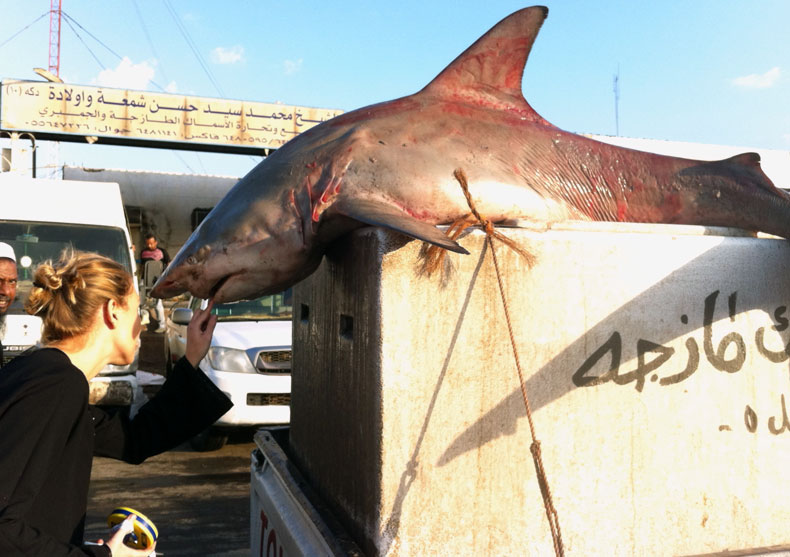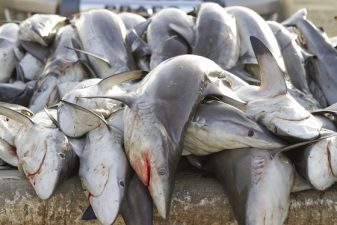 A species of shark, a sand tiger shark, thought to be extinct for over a century has surfaced in a Kuwaiti fish market. Step aside, Team Zissou; looks like local fishmongers are joining the elite biological teams researching the world’s oceans.
A species of shark, a sand tiger shark, thought to be extinct for over a century has surfaced in a Kuwaiti fish market. Step aside, Team Zissou; looks like local fishmongers are joining the elite biological teams researching the world’s oceans.
Many discoveries relevant to conservation of threatened species are emerging from commercial fish markets in Yemen, Kuwait, the United Arab Emirates (UAE) and Saudi Arabia.
Informal networking is significantly improving the biological knowledge bank, with fisherman often reaching out to academics when unusual creatures appear in their nets. Rima Jabado, a PhD student at United Arab Emirates University, was contacted by a fisherman who caught an unfamiliar shark, resulting in the first scientific record of a sand tiger shark in UAE waters.
It’s not unusual to find legally protected species such as whale sharks for sale in markets. Shark fishing is prohibited by law in Saudi Arabia, yet large numbers of sharks are sold openly at local markets.
How the shark came back to life
Jabado told Scientific American, “There is clear need for better enforcement of current legislation.”
Fish market surveys are increasingly being used to supplement traditional field sampling as they capitalize on industry resources that can magnify the breadth and scope of a research team’s study.
Julia Spaet, a researcher at King Abdullah University of Science and Technology in Saudi Arabia, says that “the resources dedicated by a fleet of fishermen will always outmatch any scientific efforts to assess abundances. The fishing industry is more efficient at finding sharks where there are not many left.”
The surveys are tricky. Researchers have to identify, count, measure and document the “species of interest” before fishermen move the catch to market. They often buy the fish outright to step around time constraints (of getting freshly caught fish to vendors) and uncooperative fishermen.
Let’s go back to that resurrected shark. In 1902, naturalist Wilhelm Hein discovered the fish in Yemen and brought a specimen back to Austria. It sat unnoticed in the Vienna Museum for decades; so we can assume the facility was relatively cat-free. In 1985, well past its sell-by date, naturalists identified it as the first (and only known) specimen of Carcharhinus Leiodon, or smooth-tooth black-tip shark.
“Some suspected it might be extinct or not a valid species,” said Alec Moore, from the International Union for Conservation of Nature (IUCN) Shark Specialist Group’s Indian Ocean group, since scientists had never found others.
During a 2008 Shark Conservation Society research expedition, Moore spotted among the many species of whaler shark in a Kuwait fish market one that looked similar, but different, to other species. Turned out to be another smooth-tooth black-tip, caught more than 3,000 kilometers from where Hein’s fish was found; the first of its kind seen by scientists in over a century.
In 2013, Marine & Freshwater Research reported that recent studies in fish markets throughout the region have located 47 additional smooth-tooth black-tip sharks, greatly increasing what scientists know about this species. Better understanding of how large the sharks grow, number of offspring, and data on habitat enables development of an effective species conservation and management plan.
Moore offers this tip to land-based shark hunters, “Always go to the fish market with a camera, especially in tropical countries where there is little data—there is always the chance that you could find something new.”
Image of Julie Spaet and shark from Julie Spaet and KAUST




Arn’t sharks “haram” or forbidden to eat by Muslims? Past GP articles have shown large numbers of sharks that were caught in the Arabian Gulf, mainly to send the fins and tails to markets in the Far East.
Muslims can eat seafood. They can’t eat pork.
http://gulfnews.com/news/gulf/uae/environment/uae-acts-to-stop-shark-finning-in-middle-east-1.1290555
^^Read
and shark catching is being managed here in Kuwait for two years now.
Stop that cruelty?